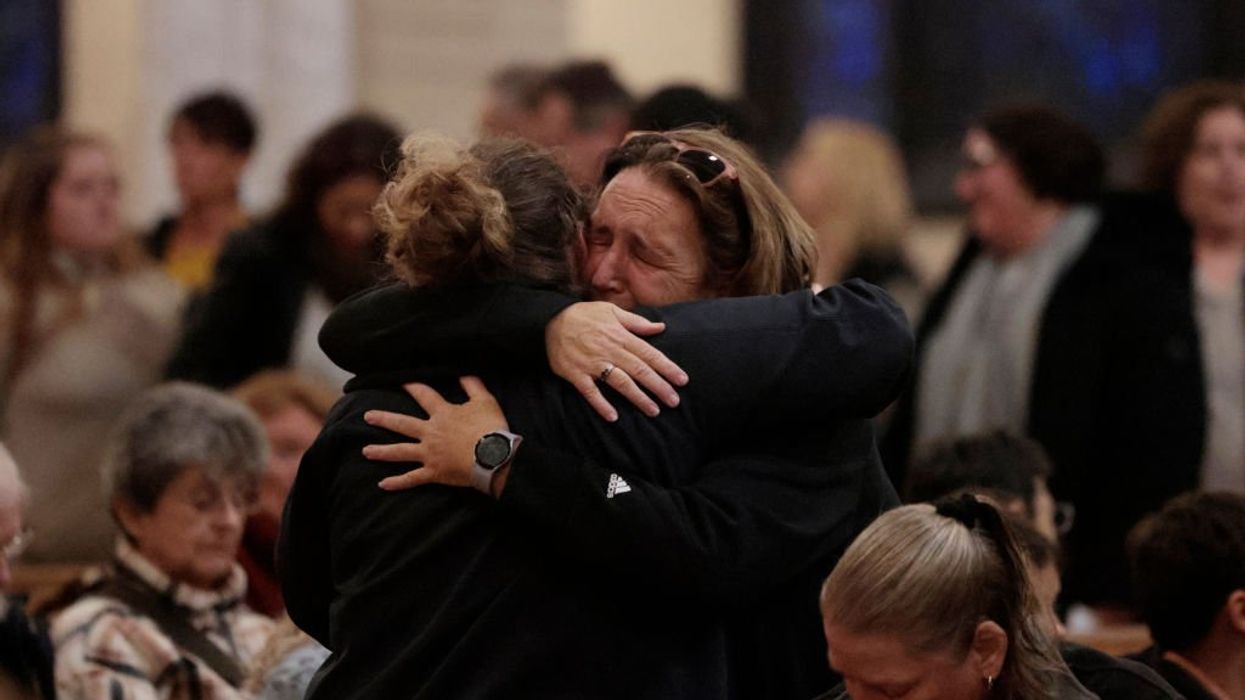
Community members embrace during the One Lewiston Community Vigil to remember the victims of a mass shooting. Photo by Jessica Rinaldi/The Boston Globe via Getty Images

Law enforcement officials across Maine received warnings that a deranged Bowdoin man might pose a threat to the public weeks before he allegedly massacred 18 people in Lewiston, then killed himself.
The alleged shooter was a sergeant with the Army Reserve's 3rd Battalion, 304th Infantry Regiment, who recently lost his job at a recycling center. In the lead-up to his monstrous final episode, he also began hearing voices, which he blamed on his new hearing aid.
In mid-September, the Army Reserve tipped off Sagadahoc County Sheriff Joel Merry about "veiled threats" issued by the alleged shooter. Sheriff Merry, whose jurisdiction covers the alleged shooter's Bowdoin home, sent a deputy to the home but "couldn't locate him," reported the Associated Press.
While his deputy didn't have any luck, Merry figured others might, so he sent an alert to every law enforcement agency in Maine.
Shannon Moss, a spokesperson for the Maine Department of Public Safety, confirmed in conversation with the Boston Globe that the State Police Department along with "every other law enforcement agency in Maine" received Merry's alert.
The alert was apparently a common File 6 "blanket alert," which prompted officers to keep their eyes peeled but not to proactively search for the reservist. Sergeant Marc Marion of the Cumberland County Sheriff’s Department underscored the frequency with which such alerts are sent out, noting he'd received 25 such alerts just over the weekend.
"It’s important to note that mental health calls are a large portion of our call volume, so we get a lot of these," said Brunswick Police Chief Scott Stewart. "We take them all serious, but nothing stood out with this more than any other one that we get."
Moss said that "no bulletins or assistance was requested" in conjunction with the alert.
The FBI told the Associated Press that agents hadn't been looking at the alleged shooter prior to the massacre, noting the bureau "did not have nor did it receive any tips or information concerning" him.
It appears as though a July incident involving the alleged shooter failed to make the FBI's radar.
New York State Police officers were reportedly called on July 16 to West Point by his superior officers regarding his behavior and threats he had made against other reservists. As a result of the NYSP intervention, he underwent two weeks of mental health evaluation at the Kelly Army Community Hospital at the U.S. Military Academy.
Michael Sauschuck, the commissioner of the Maine Department of Public Safety, said that there was no evidence the alleged shooter had been involuntarily committed, which would have triggered an incident report for the military database and an alert to the FBI.
Maine's so-called "yellow-flag" law, whereby a mentally compromised individual can be forced to give up his guns if recognized by a judge as a threat, appears to have failed to stop the shooter.
"If in fact the suspect was hospitalized for two weeks for mental illness, that should have triggered the yellow-flag law and he should have been separated from his weapons," said U.S. Sen. Susan Collins (R-Maine), reported Connecticut Public.
Extra to the September tip-off from the base, blasted statewide in turn by Sheriff Merry, the alleged shooter's sister-in-law Katie Card told NBC News the family reached out to police and the Army Reserve "to make sure everyone was on the same page, because he is someone who does gun training. ... We were concerned about his mental state."
The sister-in-law said that the alleged shooter, who had severe hearing loss, had allegedly been "picking up voices that he had never heard. ... His mind was twisting them around. He was humiliated by the things that he thought were being said."
"He was just very set in his belief that everyone was against him all of a sudden," she added.
Like Blaze News? Bypass the censors, sign up for our newsletters, and get stories like this direct to your inbox. Sign up here!